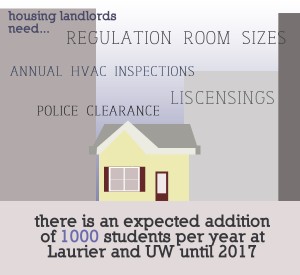Traditional housing options diminish for students in Waterloo


The landscape in Waterloo is changing.
Over the last several years the areas in close proximity to Wilfrid Laurier University and the University of Waterloo have taken on a new look. Clusters of highrise apartment buildings have appeared on the skyline, casting a shadow over the houses that once stood in their place.
The Region of Waterloo has reached its capacity for urban sprawl and the universities continue to grow.
The only solution is to build up.
Sam Somwaru is a landlord in Waterloo who owns multiple properties throughout the city. He is frustrated, however, because of the increase in development companies in Waterloo that are buying out small rental properties to erect highrise apartment buildings.
“It makes things difficult for us small guys because [Waterloo has] so many restrictions and those big buildings are exempt,” Somwaru explained.
Landlords, according to Somwaru, have to adhere to specified room sizes and provide HVAC inspections annually.
“And the big buildings are exempt from them,” he added. “They don’t have to adhere to the license process; they don’t have to have a license. But these small guys with houses have to get a license renewed every year and it’s expensive.”
“There are so many restrictions with houses.”
Somwaru was approached by a development company who offered to buy one of his properties on Lester Street.
“They say it’s a safety issue but I don’t think it’s a safety issue because with big buildings, they are more prone to accidents, like fires, because you have so many people in a building,” he said.
Mike Milovick, president of the Waterloo Region Apartment Management Association provides leadership to roughly 500 landlords throughout Waterloo Region. He addressed some of the concerns from the rapid increase in apartment buildings..
Milovick explained that bylaw regulations differ for houses and apartment buildings.
“In Waterloo there is a licensing bylaw that affects properties that are smaller than four-plexes or what the city deems to be an apartment building,” he said. “A property that is generating any rental income, whether it’s a single family house, a duplex, lodging house, triplex, require rental license, whereas with the apartment buildings they do not require one.”
Somwaru does not believe that these bylaw regulations are fair.
“One of the guys that owns twice as much as I do, it costs him like $47, 000 to have his places licensed,” Somwaru said, “Whereas these big guys don’t have to pay anything.”
Milovick was optimistic that the increase in large-scale residential development will address the growing student population in Waterloo. “The universities are growing and they are growing on a permanent basis,” he said.
“According to Milovick, there are expectations of an additional 1,000 students at the universities each year until around 2017.
Olivia Gabrielli, a student at Laurier, has lived in both houses and apartments. “It seems like they’re constructing buildings really quickly,” she said. “I personally hate living in apartments. I like more living space but it’s harder to find houses close to campus.”
Gabrielli explained that when she first arrived at Laurier four years ago, one of the appeals was the number of houses close to campus. Apartments are more expensive, she has found, in spite of the smaller living space.
In spite of the rise of the student apartment building, Somwaru continues to advocate for the conservation of student houses.
“The noise level is more controlled in a house,” he said. “Students love houses. People moving into the big buildings say it’s noisy, it’s expensive, it’s rowdy and they don’t like it. There’s no space, no backyard or anything like that.”
“My impression is they’re trying to force the small guys out of business.”

